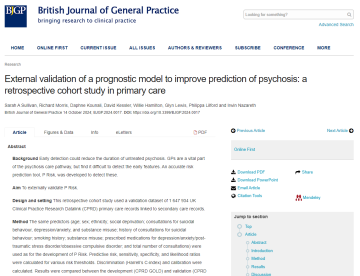Psychosis risk prediction tool could help GPs detect risk of condition early
- 15 October 2024
GPs could potentially use a psychosis risk prediction tool (P-risk) developed by researchers supported by Bristol’s and London’s Biomedical Research Centres to detect whether their patients are at risk of experiencing psychosis. The team developed P-risk to help GPs identify at-risk patients as early as possible.
Psychosis is a mental health condition that might involve seeing or hearing things that other people cannot see or hear (hallucinations) and having firmly held beliefs that others do not share (delusions). Outcomes for patients experiencing psychosis are often poor and get worse the longer the condition is left untreated.
Most people with psychosis in the UK enter specialist psychosis care via a referral from their GP. However, GPs can find it difficult to detect the condition’s early features and they currently don’t have access to risk prediction tools to help them screen patients.
Once the research team developed P-risk, they needed to externally validate how useful and transferrable it would be by testing it on data that hadn’t been used to develop it. They did this by accessing nearly two million electronic health records routinely collected by UK GP practices.
They found that P-risk was able to accurately predict the risk of psychosis by using medical records from patient consultations and sociodemographic data (age, gender, etc.) without the need to collect additional or new data.
The discrimination accuracy of P Risk also compares favourably to other risk prediction algorithms for physical health problems that use biomarkers (blood test results, for example). The tool’s discrimination accuracy is 78% meaning that if you presented P Risk with two patients, one who would later be diagnosed with psychosis and one who wouldn’t, it would choose the right patient 78% of the time.
Dr Sarah Sullivan, lead author, said:
“P-risk detects who may be at risk of developing psychosis and we’ve been able to confirm that it performs well outside of the dataset we trained it on. It provides an individual risk prediction and uses simple predictors that clinicians understand.
“Our tool is also automatable and can be incorporated into GP systems, such as existing risk algorithms used by GPs for physical health predictors.
“Overall, this study demonstrates the potential of electronic health records held by GPs to develop useful psychiatric tools.”
